On Wednesday, the New York Times published a piece whose opening paragraphs were highly misleading about Afghan refugees. In describing the Biden administration’s recent decision to allow the 74,000 “Afghans who have been residing in the United States to remain in the country legally for at least another 18 months,” the Times wrote:
The program does not provide a path to a green card or citizenship, which many advocates say is warranted for Afghans who were brought to the country after risking their lives to assist American forces. Many served as combat interpreters, as drivers and in other supportive roles over the two decades that U.S. troops fought in their country.
Most Afghans who were evacuated to the United States last year have already been granted another status, known as humanitarian parole, which allows them to stay for two years. But many have had trouble navigating an immigration system that U.S. officials concede was unprepared to help them. The process to reapply for humanitarian parole after two years can be cumbersome for applicants, but temporary protected status is frequently extended for designated countries by the Department of Homeland Security.
The New York Times is playing games here with the words “many” and “most.” It is true that a small number of the Afghan refugees resettling in the United States “were brought to the country after risking their lives to assist American forces.” But the White House and refugee-resettlement advocates want you to believe that description applies to the majority of refugees. That is simply not true. As I wrote in October:
By all accounts, most of the refugees now residing within our borders did not work directly on behalf of America, despite the White House’s attempts to frame resettlement efforts as an initiative “to support those who have supported this nation.” The State Department itself acknowledged that the majority of interpreters and other holders of Special Immigrant Visas — the visas given to those who aided U.S. military and diplomacy efforts in Afghanistan — were left behind. These are the Afghans who deserve our help and resettlement the most, and we have let them down. As the Washington Post reported, many of the Afghan evacuees have “minimal identification and did not appear to have worked closely with the United States.” Instead, the majority of Afghans are arriving in America on “humanitarian parole,” a classification reserved for those who do not qualify for SIVs or even refugee status. And by all accounts, they are not all the Westernized interpreters and journalists they have been made out to be: Beyond the high-profile reports of assault, there have been credible reports of child brides and other trafficking victims being brought onto U.S. military bases by evacuees.
The Times admits that most of the Afghan refugees who are now inside our borders are recipients of “humanitarian parole,” while deceptively claiming that “many served as combat interpreters, as drivers and in other supportive roles over the two decades that U.S. troops fought in their country.” How many is “many”? Conveniently for the Times, it could be virtually any number. But the intent is clearly to make you think it is big. Whatever it might be, it is definitely not a majority — regardless of what the Times wants you to think.
So if the “advocates” the Times is uncritically parroting want to make the case for green cards and citizenship, they’re going to have to find a more substantive argument. And since most of the refugees in question weren’t directly affiliated with American forces, activists are also going to have to find a way to explain away the substantial problems other Western countries have encountered in their attempts to integrate Afghan arrivals. In Austria, for example, a study by Center for Immigration Studies scholar Jason Richwine estimated that Afghans committed crimes at a drastically higher rate than the overall population. Those problems, which were exacerbated by the White House’s laughably porous vetting protocols, were already beginning to surface in this country back in October. As I wrote:
While just over 40,000 of the expected 95,000 Afghans have arrived in the U.S. in the past month and a half, there have already been multiple allegations of sexual assault and abuse perpetrated by refugees on the U.S. Army bases where they are being housed. In the first weeks of September, two recently arrived Afghan men were indicted for federal crimes at Fort McCoy in Wisconsin, where 12,500 refugees now reside: Bahrullah Noori, 20, on multiple counts of allegedly sexually abusing victims under the age of 16, and Mohammad Haroon Imaad, 32, for allegedly trying to strangle and suffocate his wife. Later that month, the FBI opened an investigation into reports of an attack on a U.S. servicewoman perpetrated by a group of male refugees at Fort Bliss, N.M.
None of this, of course, is an argument against resettling any Afghans at all. Refugees should be judged on a case-by-case basis. But if we’re going to deal in broad generalizations, as the Times and pro-resettlement activists are doing, we should be clear about the actual facts here.
